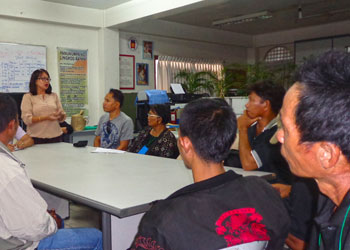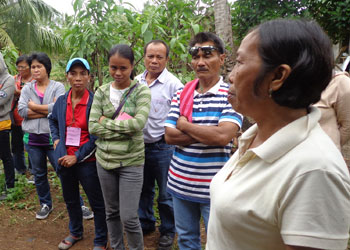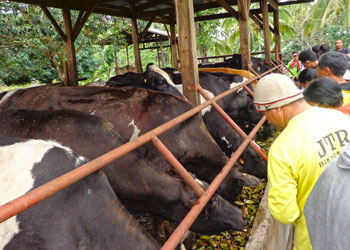Story and Photos by Sensoy Constante | Program Officer | Heifer Southern Philippines
 More than 100 potential partner families of Heifer Southern Philippines visited successful dairy farms and a dairy processing plant in Cagayan de Oro and Misamis Oriental. These co-learning cross visits, which took place February 19-27, 2013, were part of a series of capacity-building activities to ready families for the dairy industry.
More than 100 potential partner families of Heifer Southern Philippines visited successful dairy farms and a dairy processing plant in Cagayan de Oro and Misamis Oriental. These co-learning cross visits, which took place February 19-27, 2013, were part of a series of capacity-building activities to ready families for the dairy industry.
The Heifer Philippines Mindanao Regional Team, in partnership with TOUCH Foundation and Propegemus Foundation, and with full support from the National Dairy Authority (NDA) Mindanao Office Training Team, has successfully facilitated three batches of Lakbay Aral, or educational exposure trips, of 100 potential partner families in two dairy zones in the Agusan del Norte and Agusan del Sur regions.
By allowing the potential dairy farmers of Caraga Region to observe the best practices, both in the smallholder and multiplier dairy farmers, and learn the basic technical requirements of dairying, Heifer Philippines believes these partner farmers will appreciate the system of the whole dairy industry and enterprise now operating in Cagayan de Oro and Misamis Oriental. Consequently, they will apply what they learn once they become active stakeholders of the dairy project in Caraga dairy zones.
 The first stop of the co-learning visit was orientation at the Mindanao Island office of the National Dairy Authority (NDA). During orientation, Marlyn Mabale, NDA regional island manager, emphasized the NDA's role in providing technical assistance to the partner farmers of the dairy industry through various capacity development training activities, including Lakbay Aral.
The first stop of the co-learning visit was orientation at the Mindanao Island office of the National Dairy Authority (NDA). During orientation, Marlyn Mabale, NDA regional island manager, emphasized the NDA's role in providing technical assistance to the partner farmers of the dairy industry through various capacity development training activities, including Lakbay Aral.
She reiterated the qualifying terms of the NDA and Heifer-assisted project. In order for a farmer to qualify for the project, he or she must have access to the basic requirement of dairy farming, which includes at least 1.85 to 2.5 acres of fully planted forage grasses, a potable water system, animal housing and an electric power supply. NDA conducts three consecutive inspection visits to confirm these requirements are met.
After orientation, the farmers visited two successful smallholder farms of NDA recipients in Misamis Oriental. Catiil, a smallholder farmer, shared the ups and downs of her journey in dairying for the past five years before the farm turned into an entrepreneurial success. She recalled that she and her family experienced difficulties in the first two years of their dairy venture. NDA provided them with two pregnant dairy cows at the beginning, but one died and the other was sickly, possibly because it lacked good nutrition, and it failed to produce milk. Catiil did not lose hope and instead planted almost five acres with improved forage grasses including Napier, ipil-ipil and signal grass. She also reapplied to NDA authorities for another set of the animal loan of two dairy cows as new livestock. After inspecting the forage plantation, her application was approved. She strictly followed the technical requirements, especially the proper feeding program, and the cows started producing milk. After five years, she now has 12 dairy cows with an average daily production of about 2.6-3.2 gallons of milk per cow.
 After the farm visits, the partner families were brought to the Highland Fresh Dairy Processing Plant in El Salvador City, Misamis Oriental. The families observed the entire milk processing procedure of various chains of dairy products, including milk bars, different-flavored milks and mozzarella cheese. The participants realized the strict adherence of the processing plant in checking a list of qualities for milk produced at the farms before it is accepted for processing. They also noted the importance of strictly observing hygiene and sanitation practices, starting at the production unit, which actually begins with farmers because it greatly affects the milk quality. The visitors also enjoyed tasting the finished products.
After the farm visits, the partner families were brought to the Highland Fresh Dairy Processing Plant in El Salvador City, Misamis Oriental. The families observed the entire milk processing procedure of various chains of dairy products, including milk bars, different-flavored milks and mozzarella cheese. The participants realized the strict adherence of the processing plant in checking a list of qualities for milk produced at the farms before it is accepted for processing. They also noted the importance of strictly observing hygiene and sanitation practices, starting at the production unit, which actually begins with farmers because it greatly affects the milk quality. The visitors also enjoyed tasting the finished products.
This experience was important for the partner families to better appreciate the milk products and increase their awareness in order to acquire a taste for drinking fresh milk, which they will soon produce in their own dairy farms. Milk will not only be a source of income, but a good source of nutrition for their families.
At the post-reflection session, the partner families said they had renewed inspiration from the visits. One dairy farm owner, Dominique Ilugon, clearly stressed a dairy farmer must have passion, patience, perseverance, focus and dedication to become successful. Participants were inspired by these lessons and best practices of dairy farmers who have been transformed into businessmen and women. Participants now realize, "There is daily money in milk.”